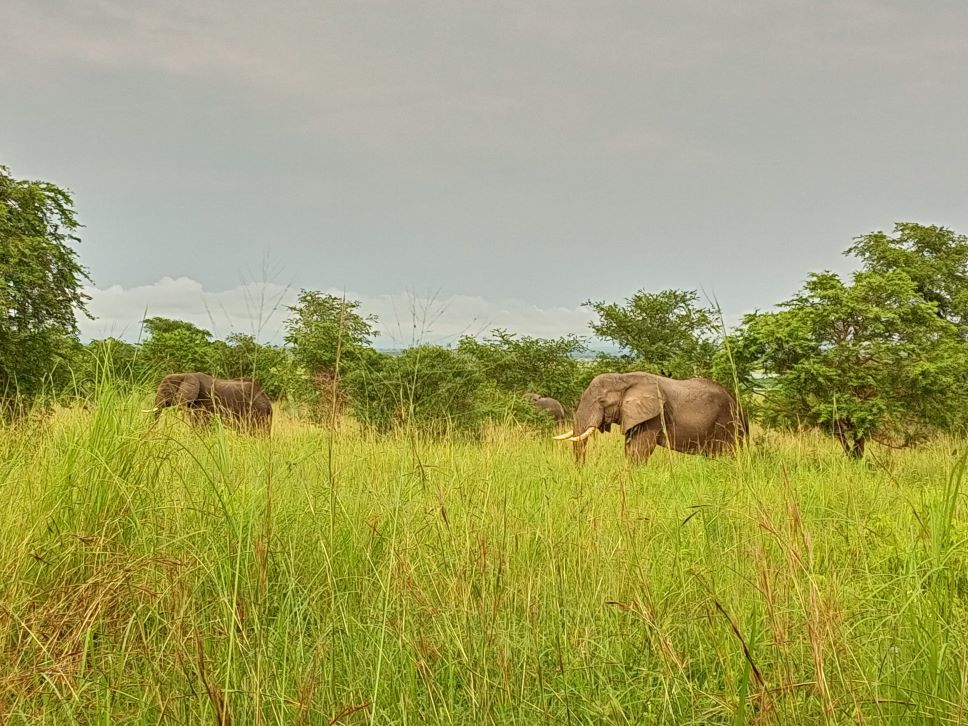NWOYA, May 30, 2025 –– More than 100 elephants from Murchison Falls National Park have invaded four villages in Lii Sub-county, Nwoya district, destroying large swathes of food crops and prompting residents to flee their homes at night.
The affected villages, Got Lunyang, Gony Cogo, Ceke, and Pakawera have reported nightly incursions that happen between 7pm and 8pm, over the past week.
Stephen Opio, a resident of Ceke village, told our reporter that the elephants began appearing about a week ago and have consistently returned, trampling crops such as maize, soybeans, and groundnuts. He said he lost 30 acres of maize and soybeans on Tuesday night when around 15 elephants descended on his farm.
In Got Lunyang, Gloria Arach said many residents now abandon their homes at night and sleep at Got Lunyang Trading Centre, fearing for their safety.
“We are scared for our lives. But beyond that, our livelihoods are gone. How will we feed our families, pay school fees, or meet basic needs?” Arach asked.
Local leaders call for urgent intervention
Odong Justine Ajaji, the LCIII Chairperson of Lii Sub-county, confirmed the elephant invasion and said local authorities are currently assessing the scale of crop and property damage.
He added that while he has contacted Uganda Wildlife Authority [UWA] rangers for help, there has been no concrete response.
“We were allocated 22 kilometres of electric fencing by UWA, but only eight kilometres have been installed. Elephants now enter through unfenced areas,” Odong said.
Peter Ewalu, the Karuma Reserve Manager at UWA, acknowledged the reports and assured residents that rangers would be dispatched to drive the elephants back to the national park.
“We will verify the information and send rangers to assist,” Ewalu said.
Frustration over delayed compensation
Meanwhile, residents in Nwoya, especially those in Lii Sub-county, have voiced growing frustration over the government’s delay in compensating them for property and crops lost to wildlife incursions.
For years, wild animals have destroyed farms, damaged property, and in some cases caused fatalities, yet many affected residents have received no compensation.
In October 2022, Parliament allocated funds for compensation in accordance with the Uganda Wildlife Act, 2019, which mandates UWA to allocate 2 percent of its revenue towards a compensation fund for victims of wildlife attacks.
Denis Ojok, a farmer from Gony Cogo village, said he lost 12 acres of soybeans and maize, and five acres of beans to elephants in 2022.
“I invested over Shs 4 million in my farm. The damage was documented and reported to UWA, but I haven’t received any compensation,” Ojok said.
Scovia Adokorach, another resident of Gony Cogo, is also still waiting for compensation, four years after elephants destroyed five acres of maize and three acres of beans on her farm.
“We filled out forms, even gave money to officials for facilitation, but nothing has come through,” she lamented.
Hope fading among farmers
Chairperson Odong said many farmers are losing hope of ever being compensated.
“People spend their own money to help with the documentation process. Some have waited more than two years. My people are growing desperate and frustrated,” he said.
Efforts to get a response from the district agricultural department were unsuccessful, as repeated calls to the district agricultural officer went unanswered.
However, UWA’s Ewalu maintained that compensation processes are underway.
“It takes time to process claims, but I can confirm that some payments have already been made. For those still waiting, the process is ongoing,” he said.
Buy your copy of thecooperator magazine from one of our country-wide vending points or an e-copy on emag.thecooperator.news
